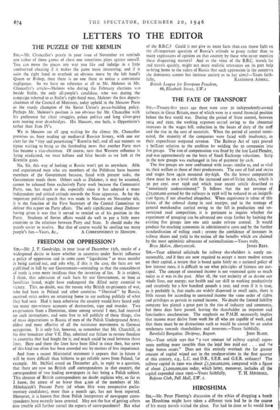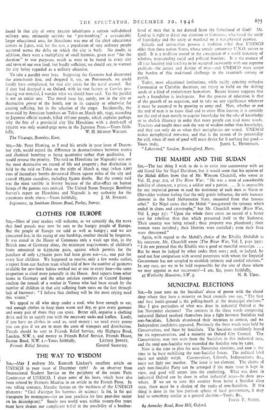HIROSHIMA
SIR,—Mr. Peter Fleming's discussion of the ethics of dropping a bomb on Hiroshima might have taken a different turn had he in the course of his many travels visited the place. For had he done so he would have
found in that city of some 300,000 inhabitants a certain well-defined military area, eminently suitable for " pin-bombing," a co asiderably larger educational area, for Hiroshima was one of the chief educational centres in Japan, and, for the rest, a population of very ordinary people scattered across the delta on which the city is built. No doubt, in addition, there were a multiplicity of small factories, given over " for the duration " to war purposes, much as were to be found in every city and town of our own land, but hardly sufficient, we should say, to warrant the city being regarded as a military objective.
To take a parallel over here. Supposing the Germans had discovered the atom-bomb first, and dropped it, say, on Portsmouth, we could hardly have complained, for that city exists for the naval arsenal. But if they had dropped it on Oxford, with its vast factory at Cowley pro- ducing war material, I wonder what we should have said. Yet the parallel is not an unfair one. The moral issue lay, surely, not in the size or destructive power of the bomb, nor in its capacity or otherwise for causing suffering, but in the selection of the target. Incidentally, the mass-raid by American bombers on Tokio on March 9th, 1945, according to Japanese official records, killed 187.000 people, which explains perhaps why the fate cf a provincial city like Hiroshima with a death-roll of 100,000 was only second-page news in the Japanese Press.—Yours faith-
The Vicarage, Bromley, Kent.



































 Previous page
Previous page